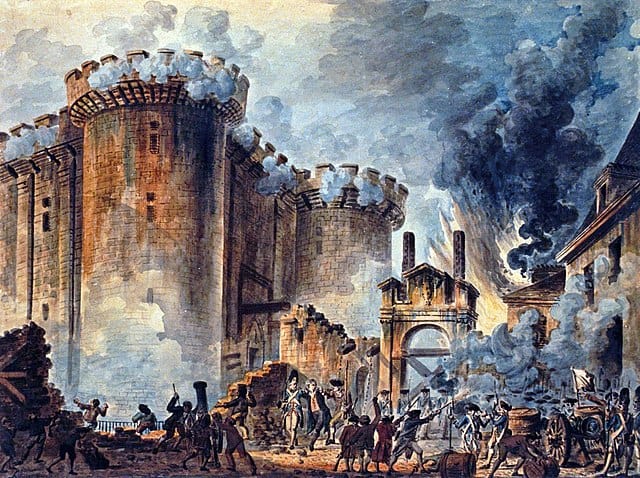As you may already know, the 14th of July is France’s national holiday. However, the French may be very surprised if you wish them a happy Bastille Day as it is locally known as “La Fête Nationale” or more simply, “le quatorze juillet” (the fourteenth of July).
It is a bank holiday, and as it is often the case in France, expect closed stores and restaurants, except in the most touristy areas. In addition, the French take advantage of the occasion to celebrate with a wealth of patriotic display and good old fashion summer fun.
How did Bastille Day come to be? What should you expect if you spend the 14th of July in France? Are there any famous Bastille Day traditions? You can read everything you have ever wanted to know about Bastille day here!

Bastille Day: A little historical background

via Wikipedia
Bastille Day marks the date when the Parisians stormed the Bastille, an iconic prison and military fortress, in the early days of the French Revolution. Here is why that day is still relevant today.
July 14th, 1789
Contrary to popular belief, July 14th, 1789, was not the beginning of the French Revolution.
Political and popular unrest was already widespread by the late 1780s.
The government, headed by King Louis XVI and his queen Marie-Antoinette, was severely indebted. Some debts were inherited from previous administrations, and some were due to their extravagant spendings both on their political campaigns (like the help sent to the American revolutionaries) and their lavish lifestyle.
The French people, on the other hand, was facing severe difficulties. In 1788, the populace was dealing with a nationwide famine due to widespread crop failure and prevalent unemployment. The price of bread was at an all-time high, and violent riots were taking place all over France by the end of winter.
Louis XVI
Louis XVI's attempts at resolving the crisis were met by a mixed success and tensions between royalist soldiers, and unruly crowds grew in the months that followed. Finding arms and food became a priority for the Parisians. On the morning of July 14th, 1789, a mob took over the military hospital known as the Hotel des Invalides and seized 32,000 muskets and some cannons.
However, they were missing one thing: gunpowder. Hence, they turned their sight on to the old royal fortress of Bastille where large quantities were stored. The massive building-turned jail was built in the 1300s and protected by a motte and over a hundred soldiers. More than a simple prison, it was also a symbol of the royal authority since prisoners could be locked in without any due process by order of the king.
Bernard-René de Launay
The governor of the Bastille, Bernard-René de Launay, invited a delegation inside to negotiate. The crowd grew antsy as the talks dragged on, and soon, the bloodthirsty mob attempted to take over the fortress to free the delegates they feared were held prisoners.
It was a bloodbath. The royalists initially held their own, and nearly 100 attackers lost their lives while only one royalist soldier perished. However, as reinforcement to the revolutionaries made its way to the Bastille, de Launay surrendered. He was promptly decapitated, and the Bastille was torn down in the months that followed, the stones reused or sold as souvenirs.
Fête de la Fédération
A year later, on July 14th, 1790, hundreds of thousands of Parisians along with the King, the Queen, and government delegates, celebrated the first anniversary of the storming of the Bastille. This massive party, known as the Fête de la Fédération (Celebration of the Federation), was the occasion for the King and the representatives to swear allegiance to the Nation.
Unfortunately, this display of unity was short-lived, and Louis XVI and Marie-Antoinette were beheaded a few years later.
See also:
The 14th of July as a French national holiday
The Third Republic was a time of political reconstruction for France. After the loss of the Alsace and Lorraine and the divide between Bonapartists, Monarchists, and Republicans, a strong unifying symbol was dearly needed. On July 6th, 1880, the 14th July was declared as a national holiday by law and has been celebrated ever since.
Patriotic French vocabulary
| Vive la France ! | Long live France! |
| Liberté Égalité Fraternité | Freedom Equality Brotherhood (French motto) |
| Le drapeau | The flag |
| La Marseillaise | French national anthem |
| Le Quatorze Juillet or Fête Nationale | Bastille Day |
Bastille Day traditions
Celebrations take place all over the country, including in the smallest villages. Many French people attend large-scaled events, but others prefer to stay home and enjoy their day off with friends and family.
The military parade
The military parade down the Champs-Elysées in Paris, the largest and the oldest in Europe, kickstarts the celebrations. French troops march and their allies march in a lavish display from the Arc de Triomphe down to the Place de la Concorde for over 2 hours as the crowds cheer alongside the parade. It involves over 4,200 soldiers, 220 vehicles and 100 aircraft and is often the occasion for the French president to honor foreign guests.
The parade is broadcasted on live TV, and many French people choose to watch it in the morning.
French Vocabulary: Military Parade
| Le défilé militaire | The military parade |
| La parade | The parade |
| Les soldats | The soldiers |
| Les officiers | The officers |
| Les avions | The airplanes |
Public dances
Public balls on the 13th and a 14th of July are a favorite way to celebrate Bastille Day. Even small towns usually offer some kind of dance party with live bands and DJs.
Several are held in Paris, including the largest one at place de la Bastille, where the fortress once stood. The town also organizes a free concert on the Champs de Mars.
Aside from these, firefighters around France organize popular balls in many fire stations around France on the 13th and the 14th of July. Entrance is usually by donation in a “barrel” (letonneau), and the proceeds go toward upgrading the amenities offered to the firemen. The atmosphere is often somewhat kitschy but good-natured.
Bastille Day Celebration Vocabulary: Part 1
| Le Bal des pompiers | The firemen’s ball |
| La caserne | The fire station |
| Le bal populaire or bal musette | The country ball |
| La buvette | The refreshment area |
Fireworks displays

Image Source
Firework displays are popular in many places across the country, from small towns to local landmarks. They are sometimes preceded by concerts and other events, like community meals. The most popular ones are held near the Eiffel Tower in Paris, and it can get very crowded.
Bastille Day Celebration Vocabulary: Fireworks
| Les feux d’artifices | The fireworks |
| Un petard | A firecracker |
| Le bouquet final | The grand finale |
Low-key Bastille Day celebrations
Some French people prefer to stay home and avoid the crowds on Bastille Day. It is summer and school vacation after all, so many simply invite friends over for a meal and a relaxing afternoon after watching the parade on TV in the morning.
Bastille Day Celebration Vocabulary: Part 2
| Les grillades | the French version of barbecue-- |
| La pétanque / les boules | a popular ball game (especially in the South of France) similar to bocce |
| L’apéro or aperitif | Pre-dinner drinks, often served with a light fare |
To know more about French culture and traditions, sign up to the weekly newsletter below!
SIGN UP BELOW...
AND GET INSTANT ACCESS TO THE FREEBIES

Your turn!
Have you ever been in France on the 14th of July? Are there any celebrations for Bastille Day where you live? Share with us in the comments!

